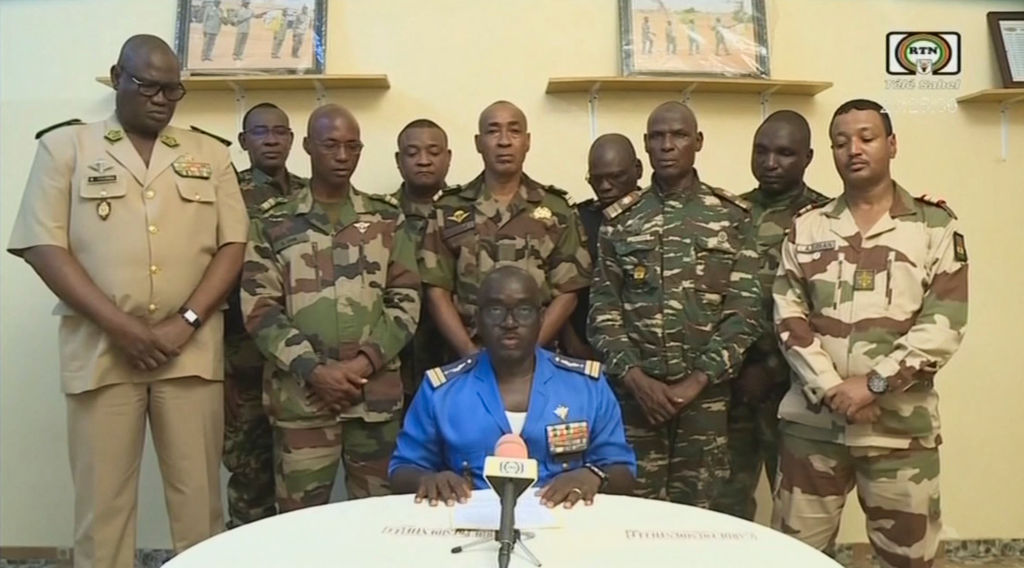Will Niger Junta Repeat Neighbors’ Mistakes?
ADF STAFF
As Niger’s military junta has held the deposed president in isolation, the country has become increasingly isolated by the international community — one of the many consequences of unconstitutionally seizing power.
Nigerien President Mohamad Bazoum has said he is being held “hostage” and “deprived of all human contact” with no electricity and only dry rice and pasta to eat.
“I am just one of hundreds of citizens who have been arbitrarily and illegally imprisoned,” he wrote in an opinion piece published by The Washington Post on August 3. “This coup … has no justification whatsoever.
“If it succeeds, it will have devastating consequences for our country, our region and the entire world.”
While the recent spate of military-led regime changes in the Sahel offers plenty of warnings, the Niger putschists appear to be following the same path as the ones in neighboring Burkina Faso and Mali.
All three juntas have drawn condemnation and sanctions from the Economic Community of West African States (ECOWAS), the regional bloc, and the ousted government’s international partners.
Military forces overthrew the presidents in Mali and Burkina Faso in 2021 and 2022, respectively, with extremist violence increasing and spreading. Each country had a second military coup within a short period.
By contrast in Niger, fewer people were killed in the first six months of 2023 than in the first half of any year since 2018.
“Compared to the crude approaches employed by neighboring juntas, Niger’s counterterrorism approach has generally been more targeted and involved a better mixture of kinetic and non-kinetic tools,” analyst James Barnett wrote in a report for the Hudson Institute think tank.
Barnett, who researches conflict, terrorism and geopolitics, listed several other mistakes by neighboring juntas that Niger now risks repeating.
- Aggressive use of force, sometimes indiscriminately: Junta-backed militias in Burkina Faso have been accused of ethnically targeted violence, which typically boosts recruitment for extremist organizations.
“The turmoil caused by the Niger coup and possible ECOWAS intervention will offer these terrorist organizations an expansive living space,” Huriye Yildirim Çinar, co-director of TASAM African Institute, wrote in the Daily Sabah newspaper on August 11.
“On the other hand, large communities of people struggling with economic and political difficulties and ignored by the state mechanism may have to interact with these terrorist organizations to survive.”
- Vulnerability to another coup: “When generals focus on politics in hopes of forestalling the next coup, they tend to subordinate battlefield considerations to political ones,” Barnett wrote. This could lay the groundwork for a countercoup, deepening national insecurity.
- Alienating regional and international partners: France, the European Union and others have cut off financial support to Niger. Roughly $2 billion in annual aid is at risk. “Foreign aid makes up 40% of our national budget, but it will not be delivered if the coup succeeds,” Bazoum wrote.
- Aligning with the Russian mercenary Wagner Group: Niger already has followed Burkina Faso and Mali in canceling military agreements with France. Mali filled its security void with the lawless Wagner mercenaries, who have been accused of atrocities against civilians.
“Wagner feeds the worst tendencies of West African military regimes, and its cronyist, sledgehammer approach to counterterrorism has backfired in Mali, killing scores of innocent civilians and accelerating jihadist expansion,” Barnett wrote.
Observers have noted the hypocrisy of Niger’s military junta citing insecurity as a central reason for usurping power.
“As if security was not in their hands before,” Nigerien politician Oumar Moctar tweeted.
Barnett says Nigeriens don’t have to look far to see the ill effects of military rulers.
“It might indicate a shift to the more reckless approaches employed by Bamako and Ouagadougou,” he wrote. “If Niger goes the way of Mali and Burkina Faso, new major challenges would emerge for the rest of West Africa — particularly the coastal states.
“If the coup plotters make the same mistakes as their neighbors in Mali and Burkina Faso, they will create opportunities for the jihadists in that region to accelerate their expansion from Tillaberi into northern Benin and northwestern Nigeria.”


Comments are closed.